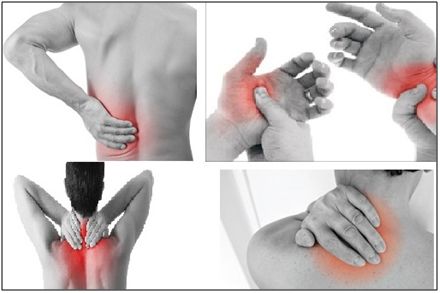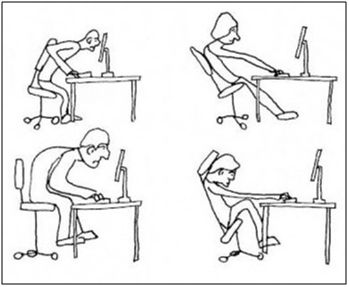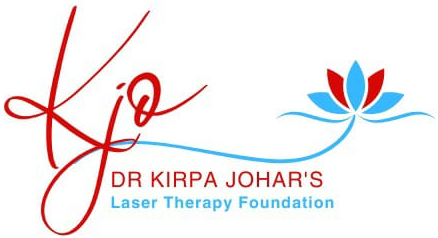What is Repetitive Strain Injury RSI?
Repetitive Strain Injuries (RSIs) are injuries to the soft tissue of the body caused by overuse or misuse. Soft tissue includes tendons, ligaments, muscles, fascia, nerves and blood vessels.
The parts of the body most often affected are the neck, shoulders, arms, elbows, wrists, hands and fingers.
Repetitive Strain Injuries (RSI) includes many localized injuries such as golfer’s and tennis elbow and carpal tunnel and also more diffuse pain syndromes (those spread over the body) which may be diagnosed as cervicobrachial pain syndrome or chronic pain syndrome.

Parts of body affected by repetitive strain injury
Peripheral neuropathy may affect one nerve (mononeuropathy), two or more nerves in different areas (multiple mononeuropathy) or many nerves (polyneuropathy).
Common RSI Symptoms
Symptoms of RSI or an overuse injury can be any of the following:
- Burning, aching or shooting pain.
- Tremors, clumsiness and numbness.
- Fatigue or lack of strength.
- Weakness in the hands or forearms. It is often difficult to perform even simple tasks.
- Difficulty with normal activities like opening doors, chopping vegetables, turning on a tap.
- Chronically cold hands, particularly the fingertips.
Not everyone will have every symptom, nor is there a definite order in which people experience symptoms. Moreover, RSI signs may not occur until several hours, days, months, or even years after the activity which causes them.
Causes of RSI
Symptoms of RSI or an overuse injury can be any of the following:
- Repeated arm use for too long
- Working with equipment that doesn’t fit your body
- Working too fast
- Not having enough recovery breaks
- Holding your muscles in the same position for a long time.

Repetitive strain injury due to poor posture
What's Injured by RSI ?
RSI potentially damages your muscles, tendons, nerves and joints through repeated micro-trauma.
Muscles & Tendons
Whenever muscles or tendons are used, tiny tears can occur in the muscle or tendon tissue. The local area becomes inflamed for a short time as the body attempts to repair the damage.
Thickening and scar tissue form over the torn muscle or tendon tissue. At this stage, the area will feel painful. Normally, the body would repair the damage and the pain would go away. However, without enough rest, more activity causes further damage and more inflammation, thickening, scar tissue and pain.
This cycle gets progressively worse if sufficient rest is not taken.
Nerves
Nerves are also damaged by RSI. Tingling feelings are caused by the compression of nerves. Nerves run through muscles, and if muscle health is poor, so is nerve health. Damaged nerves can heal but the process is extremely slow.
Most cases of persisting RSI have their basis in the nerves that run from the neck, down through the shoulders, and into the wrists and hands. These nerves pass by many other structures, most notably the discs and facet joints in the neck. If the discs or muscles become damaged or tight – often due to a poor posture – then the nerves cannot move freely in the arm.
If these tight nerves are then used repetitively, such as when typing or process working, they naturally become sore and inflamed. If this process is repeated before the nerve has recovered, the problem worsens. Before long it can be difficult to perform any task, even lifting a coffee cup, without feeling pain. Many different nerves course through your arms.
RSI can be complicated. Because you have so many nerve fibers that exit from your neck and travel through your arm, the symptoms of this problem can vary wildly. Pain can be felt almost anywhere.
Nerve-related pain is often misdiagnosed as a variety of conditions, including rotator cuff tendonitis, carpal tunnel syndrome, tennis elbow, golfer’s elbow, de Quervain’s Tenosynovitis (thumb) and fibromyalgia.
Joints
In the long-term, your joint posture and movement may become abnormal and result in joint pain, stiffness and premature degenerative changes.
RSI Treatment
Whereas acute RSI is relatively simple to assess and treat successfully, is difficult to cure chronic RSI. Some people with RSI may eventually get a chronic pain syndrome that affects every aspect of their life.
Possible treatment options for RSI include:
- Medication, including anti-inflammatory painkillers (such as aspirin or ibuprofen), muscle relaxants, antidepressants
- Heat or cold packs, elastic supports or a splint
- Physiotherapy, including advice on posture and stretches or exercises to help strengthen or relax your muscles
- Steroid injections to reduce inflammation in an affected area (this is only recommended if an area has definite inflammation caused by a specific condition, such as carpal tunnel syndrome)
- Surgery to correct specific problems with nerves or tendons (for example if you are diagnosed with carpal tunnel syndrome) if other treatments haven’t helped.
Low Level Laser Therapy Treatment for RSI
Low Level Laser Therapy (LLLT) is the application of red and near infrared light over injuries to stimulate cellular repair. LLLT has a powerful anti-inflammatory effect as well as a healing effect.
LLLT stimulates blood flow and lymphatic drainage, improved delivery of O2 and nutrition to the area, oxygen utilisation, removal of oxygen-free radicals and other waste products, and tissue healing.
LLLT treatment for RSI
Laser penetrates up into the muscles, tendons and ligaments of the body. Once the treatment site is targeted, the laser light stimulates the mitochondria of the cell within muscles, tendons or ligaments, causing them to oxidize and duplicate. This accelerates the cell division and increases healing at twice the normal rate.
You will be encouraged to move the affected area within range of movement/pain but not exert stretch or force during the healing phase.
The end result is resolution of inflammation and restoration of healthy tendons and local soft tissues. Once tissues are healed, pain is eliminated and normal range of motion and function is restored. Then muscle and tendon strength and flexibility can be addressed with graduated exercises and stretching.
LLLT has no known side effects, is safe and effective. By treating the underlying problem, LLLT results in permanent pain relief and restoration of function.
